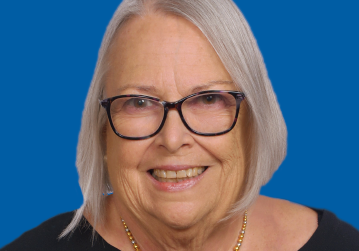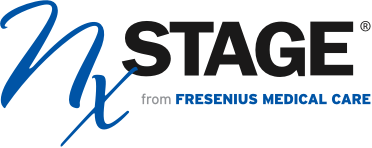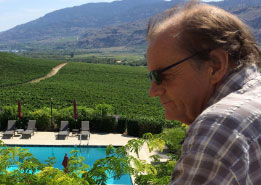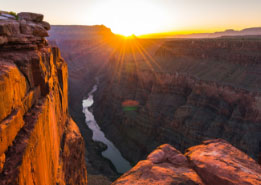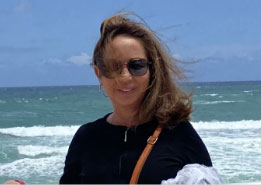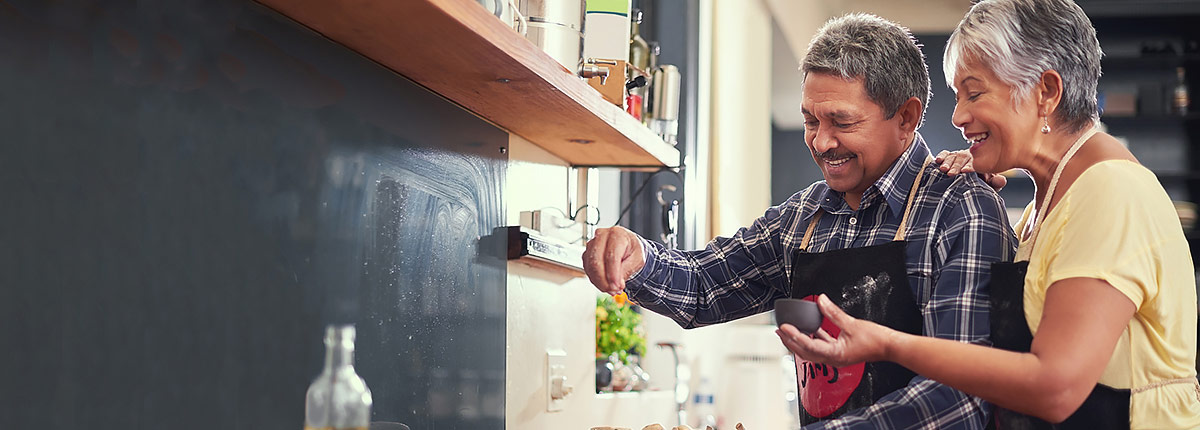Transcript
Vanessa:
Welcome to Visits With Vanessa, a podcast where we speak with home hemodialysis patients and care partners about their experiences doing home dialysis. I’m a dialysis patient myself going on almost 25 years now. I’m the senior manager of advocacy and communities for Fresenius Medical Care. And my mission really is to share patients experiences and stories all while doing home hemodialysis because we’re out here living and let’s share our stories. Today’s episode has one big overarching theme living life with HHD, with freedom, flexibility and independence. We’re going to talk to a really great friend of mine. I honestly think she is a role model to many. She’s an HHD dialyzor who really seems to do it all. She travels. She works full time. She actually runs the nonprofit Home Dialyzors United, you might know it as HDU, that’s what it’s known as in the community. She actually does solo dialysis treatments so I’m really excited, thrilled, delighted to welcome my friend Nieltje, welcome to visits with Vanessa. How are you?
Nieltje:
Thank you so much for having me today. You and I know that we can talk for hours.
Vanessa:
So many patients, I think, have heard of Home Dialyzors United, they might not know that you are the one of the driving forces behind that. Tell me first a little bit about yourself. When did you learn that you actually needed to start dialysis How did that story and journey begin for you?
Nieltje:
So we believe that my dialysis was actually initiated by or my ESRD by an acute injury from taking a lot of medications for asthma, pulmonary problems, and that was way back in the early 1990s. So my GP was the one who found it. And we worked the next 20 years very closely together to avoid dialysis at all cost. I did things like know low protein diet, took sodium bi-carb limit any medications. But 20 years of CKD seeing different nephrologists, it wasn’t till I crashed in a hospital that the doctor who came in, I’d never seen her before said you’re not going to die, you’re too young, you will do home dialysis, and I looked at her and I said, Well, what is that? That’s when she said, my sister has done it for years and traveled all over the world. You can do it too. So when I left the hospital, I went straight to a clinic that did home dialysis with the understanding that as soon as everything was ready, I would start training. That’s exactly what happened.
Vanessa:
So, first of all, Nieltje, that’s amazing that you had a doctor that looked out for you and actually talked to you about home, which was the complete opposite experience that I had. Does that mean that you when you started dialysis, you started at home directly or you started in-center and then transitioned home? Can you clarify that?
Nieltje:
So actually was sent home in-center dialysis for about three months while my fistula matured. And also, I guess I get a place in the training.
Vanessa:
You need to have that training, right? That’s definitely part of it. So when you did Transition Home, did you automatically go home and start doing solo? How did that come into play?
Nieltje:
I wanted to do everything myself. I never wanted to be anyone else involved in my treatments. I was adamant about that. And I said that I would have someone available for emergencies. Originally when I went home, but since I was taking care of my mom and she did have an aide, the aide Taffy was able to suffice as my care partner per se, she was in the in the home with me at the time and could call 911 and so forth. So that arrangement went for several years until my mom passed. But then I also was able to move to a clinic that did allow solo home hemo and that was even better. I am the only person who touches my machine, all of my issues sets up for the treatment. I do everything and I prefer it that way. That is my thing.
Vanessa:
Were you always using a red sense from the very beginning?
Nieltje:
Oh, yes.
Vanessa:
Can you explain what red sense is? Because some patients might actually not know what that is.
Nieltje:
Venous needle dislodgement, which then if the machine doesn’t stop, it pumps all your blood out of your body. You don’t want that to happen. Not a good thing. So there is a people, various people use different things. But Red sense as a blood leak detector are designed specifically for your venous access. You put it on prior to I do it before I put my needles in and then I put my needles in, and then I put my needles in and it rests on it so that if there is a blood leak from the venous, then I would it would immediately alert me, and I could turn the machine off. I mean, in most cases, the machine will always turn off because of the alarms that it gives. So that I’ve never in all my years had any issue with excessive bleeding from the venous, which is the biggest deterrent.
Vanessa:
For other patients that are looking to do solo dialysis you might go through some initial, you know, training to learn a little bit more on how to disconnect or do an emergency rinse back and to be able to do everything by yourself. And that really does become part of the training. So it’s important to note the patients are not going to go home until you’re completely trained and feeling confident about that. And it sounds like you’re pretty confident from the from the very beginning. And that’s kind of your self-starter go getter atmosphere, which I do want to dip into a little bit because I know that being independent, you know, having that freedom is really important to you. Being able to do a HHD in the comfort of your own home during your schedule, I think is also important.
Nieltje:
My nurse training nurse was excellent and we did the in-center treatments for a couple of weeks, and then we came home and she stayed in the house first helping me, and then she would stay in the next room. And then so she kind of slowly weaned herself away from me until I felt confident.
Nieltje:
How did you keep a positive mindset? Like, sometimes you feel like maybe it is a lot. How do you keep positive?
Nieltje:
So, you know, that is exactly it. I have to be active. I needed to be doing things. I wanted to travel again, you know, and I just basically felt so much better that it was the tradeoff. I know it’s you know, it’s work. It’s a job doing your own dialysis at home, a full-time job. I like to tell people that it’s you’re literally one person, or one person and the care partner is doing the job of an entire clinic from ordering your supplies to doing your charting to doing your treatment to doing the sanitation. I mean, it’s in a clinic that would be ten people.
Vanessa:
So how do you manage it all? So you talked about like ordering your supplies and getting on your treatment. And, you know, you’re one person that’s gathering all of this, not to mention that you work full time. I know that you’re very active with your family. Every time I talk to you, you’re traveling somewhere different.
Nieltje:
So I’m pretty much always been task oriented. So that that’s a good thing. And again, it takes that first year to really settle into what I call the groove or on treatment it’s called my Zen mode. And once you found that then everything falls into place. Everything comes second nature. Now I literally order supplies in my sleep. I can set up their machine in 5 minutes to do a, you know, prepare for a treatment. I just have it all organized in steps so that it does not seem overwhelming.
Vanessa:
So like with anything, when something is new and you’re not used to it, you need to adjust to it. You need to allow even family members your schedule and things to adjust and then as you start to do it, it really does become second nature. I do this because I know this is what’s good for me. I feel like it allows me to spend time with my family. Like you, I work full time and like you, I like to travel. If you had to narrow it down to like, you know, one or two reasons why? Why you do this? What are they?
Nieltje:
Obviously, the first is family. And as I said, I never wanted to involve them in any way. Obviously, if you have kidney disease and on dialysis, it does involve the whole family. How they are involved really depends on you, I feel it’s important to let every member of your family kind of come to their own degree of comfort with with the dialysis. No one wants to watch me do a treatment. I can certainly understand that. So now I when I need help getting, say, I’m traveling and I have to get the machine in the box and into the car, that’s where they’ll come in handy to help. I’ll give them a call. We live 5 minutes apart. Other things that they help with is when my boxes arrive they’ll bring them in the house and stack them where I need them and that’s always a big help. But it’s not mandatory. And I don’t ever, you know, I firmly believe that every member will come to their own level of comfort in dealing with a dialysis.
Vanessa:
Yeah, I agree. I mean, for us, it’s become a family affair. You know, like I sit and do my treatment and we might be watching the movies and not even really a big deal. I’m sitting there with them doing a treatment and we’re all hanging out together.
Nieltje:
And for me, I have I’m lucky enough that I have a room, I have a separate room, a guest room that I put do my treatment, and that’s my Zen time. Everything that I need is at hand, and I hook up and get on, watch TV, watch my movies, but I’m in my zone.
Vanessa:
Tell me a little bit about your role and what you do and what is the mission? You’re involved in in policy, you know, you’re involved in speaking with patients you’re involved in talking to doctors and health care teams like your team, and you really do so much.
Nieltje:
I’ve worked a little bit in nonprofit and government marketing, so my work experience just kind of all came together when I started dialysis and there I was one night, something wasn’t working involving my fistula, I had questions, so I did a search and came up with home dialyzers united and started asking questions in their support group and got so many wonderful replies so quickly. And so one thing led to another, and very shortly I got an email that said please come to New Orleans and join our board. So I just kind of stepped in and did what I could with the people that were there. We have a wonderful board. I absolutely love everybody.
Vanessa:
This is like a community of patients, really. It’s by patients, for patients, helping patients, right. And what is interesting is that everybody comes from their own background and has their own story, but yet they’re all doing home dialysis and really living life to its fullest. And you are such a great example of that. So as I start to wrap it up here a little bit with you, I know that you have a new trip coming up this summer. Tell me about it.
Nieltje:
So I do actually love road trips and just to backtrack a little, when I first started dialysis and we started feeling really great and I had decided to do another cross-country trip and I mentioned it to my nurse at the time and she said, well, who’s going with you? And I said, Nobody. And she said, well, you can’t do that. You know, it never just even dawned on me that there was an issue. I mean, I put everything in the back of my car, drove across country, stadiums, couple of hotels on the way. I had taken a, I guess an Airbnb for a month near my friends in Colorado. And I had a blast. And it was just so liberating to be able to do that. So that was just one of many and the next. So this time I wanted to plan something with my grandkids there. One is in university now, the other one is in football. So they don’t have a lot of time in their schedules for Nana much, but I want to spend some time with them. You know, we used to always go to Maine in the summer and I thought, well, maybe just take a little drive up the coast starting we’re in the D.C. area anyway it would just be another road trip to notch on my belt.
Vanessa:
I love it. So you’ll put the machine in the car, get your supplies ordered, and off you’ll go with your grandkids and just kind of bop your way down the coast. You are such a great example of showing how home dialysis can be flexible, how it gives you the freedom to travel. It allows you independence and sure, there might be challenges and barriers in the beginning, but you really made it something that you are now able to take ahold of and your family gets to enjoy the time with you. And more importantly, you’re doing things for the community where you’re helping patients out new patients and able to answer questions and really a leader in the community. So thank you so much for taking the time to chat with us today.
Nieltje:
Oh, Vanessa, you make me blush, but thank you. You know, I always enjoy chatting with you where our passions show, we’re both on the same page and it’s all about living our best lives. We have a motto at HDU, It’s our day our way.
Vanessa:
I want to tell our listeners that if you have questions and you want to learn more about home dialysis, maybe you think that solo might be something for you, or have questions. You can reach out to one of our patient consultants. You can reach them at 1-888-200-6456. Or you can actually head over to next NxStage.com. What’s good to know is that our consultants are all either current or former home dialysis patients, and they love speaking with patients, they love to help you kind of figure out your own personal journey. So with that, Nieltje, I want to thank you again for hopping on the call today. I appreciate it. You’re awesome for spending time with us. You’re truly so inspiring.
I look forward to our next episode of Visits with Vanessa. Please stay tuned for important information and considerations.
Vanessa:
Home hemodialysis with next stage systems involves risks. You may not experience the potential benefits of such therapy. NxStage systems require a prescription for use. If your doctor prescribed solo home hemodialysis without a care partner during waking hours, your risk of significant injury or death may increase because no one is present to help you respond to health emergencies.
